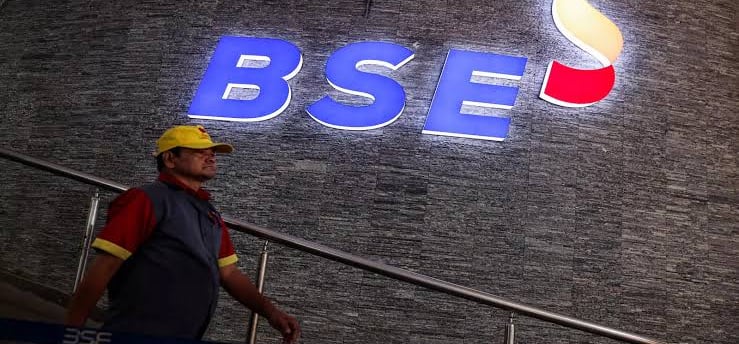Add your promotional text...
BSE Shares Plummet 7% Following Jefferies’ Downgrade: What Investors Should Know
Synopsis: Shares of the Bombay Stock Exchange (BSE) dropped by 7% to ₹4,419 after global brokerage Jefferies downgraded the stock from ‘hold’ to ‘underperform,’ citing expensive valuations and regulatory risks. Despite raising its target price to ₹3,500, Jefferies pointed out that potential market impacts from new regulations could limit growth opportunities for BSE. This marks a significant moment for the exchange, which has seen a tremendous rally of 955% since March 2023, but now faces challenges ahead.
TRENDING STOCKS
By Aman Jaiswal
10/16/20243 min read


Bombay Stock Exchange (BSE), one of Asia’s oldest and most prestigious stock exchanges, experienced a sharp drop in its stock value on October 16, 2024. The shares tumbled 7% in intraday trading, settling at ₹4,419 following a critical downgrade from global brokerage firm Jefferies. This marked a significant turn for BSE, which had enjoyed a bullish streak for much of the past year. Jefferies lowered its rating from ‘hold’ to ‘underperform,’ highlighting various challenges and regulatory risks that could adversely affect the exchange's growth trajectory.
Jefferies Downgrades BSE Due to Expensive Valuations
The downgrade from Jefferies stems from what the brokerage sees as expensive valuations for BSE. Even though the exchange has had an impressive run-up in its stock price over the past 19 months, with shares soaring by a remarkable 955%, Jefferies believes the current market price is unsustainable. The firm raised its target price for BSE to ₹3,500, but this still reflects a potential downside of about 21% from the current trading price.
Jefferies pointed out that despite the optimism surrounding new regulatory frameworks, BSE’s near-term growth potential is outweighed by various risks. These include potential regulations that could impact overall market volumes, limited spillover gains from changes at rival National Stock Exchange (NSE), and the introduction of additional regulatory measures.
Regulatory Risks and Limited Growth Prospects
One of the primary concerns Jefferies highlighted is the significant regulatory risks facing BSE. Recent changes introduced by the Securities and Exchange Board of India (SEBI) are expected to influence the overall market environment, particularly concerning options trading. SEBI’s new framework limits weekly contracts to just one sub-index per exchange, which some investors initially viewed as an opportunity for BSE to capture more market share. However, Jefferies remains skeptical about how much BSE will actually benefit from these changes.
Furthermore, the National Stock Exchange (NSE), BSE’s primary competitor, announced that it will discontinue weekly derivative contracts for Nifty Bank, Nifty Midcap, and Nifty Financial Services by November 2024, converting them into monthly contracts. While some market participants believe this shift will drive trading volumes toward BSE, Jefferies does not share the same level of optimism. The brokerage anticipates that BSE will struggle to capture a substantial market share from this shift, with the overall impact on the exchange being limited.
Unrealistic Market Share Projections
Jefferies' analysis suggested that BSE's valuation, based on a projected Price-to-Earnings (P/E) ratio of around 40x for FY26E, implies the exchange could increase its market share from 13% in Q2 2025 to approximately 30-35%, with an estimated 40-50% share in weekly contracts. However, Jefferies considers these projections overly optimistic.
The brokerage noted that while BSE may see some gains in market share, particularly in the weekly contracts segment, the broader market is likely to face a 25% decline in volumes. Additionally, monthly contracts, which make up 30% of the derivatives market, are expected to remain largely unaffected under SEBI’s new F&O framework. Given that BSE’s share in monthly contracts is just 10%, the exchange's capacity to grow its footprint in this area seems limited.
Regulatory Impact on Trading Volumes
Beyond market share concerns, Jefferies also flagged other regulatory changes that could negatively affect BSE’s trading volumes. The removal of calendar spreads and the requirement for upfront margin collection from buyers are likely to put downward pressure on overall trading volumes, including those for BSE’s flagship Sensex product. These regulatory adjustments, coupled with the uncertainty of further interventions, introduce additional risks for investors.
BSE’s Stellar 19-Month Rally: A Look Back
It’s important to note that BSE’s recent stock performance has been nothing short of remarkable. The exchange's shares have rallied from ₹430.95 in March 2023 to ₹4,540, representing a staggering 955% gain. During this time, BSE has posted positive monthly performance in 15 out of 19 months. October 2023 was particularly strong, with a 43% monthly gain, followed by another 33% jump in November 2023.
However, despite this impressive run, Jefferies now warns that the stock may be overextended and faces significant downside risks in the near future. The brokerage’s downgrade, coupled with a target price that reflects a 21% decline, has sent shockwaves through investors who have ridden BSE’s bull market.
Conclusion: What’s Next for BSE?
The recent sell-off in BSE shares following Jefferies’ downgrade highlights growing concerns about the exchange’s valuation and regulatory headwinds. While the stock has performed exceptionally well over the last year and a half, future gains may be constrained by looming risks in the broader market and new regulatory frameworks. For investors, this serves as a reminder that while BSE has been a top performer, its future growth prospects are now subject to significant scrutiny. As always, investors are encouraged to approach with caution, carefully weighing potential risks against the stock’s strong historical performance.
Disclaimer:
The views and recommendations shared in this article are those of individual analysts and do not represent the views of FinBrook. Investors should consult with certified financial experts before making any investment decisions.
